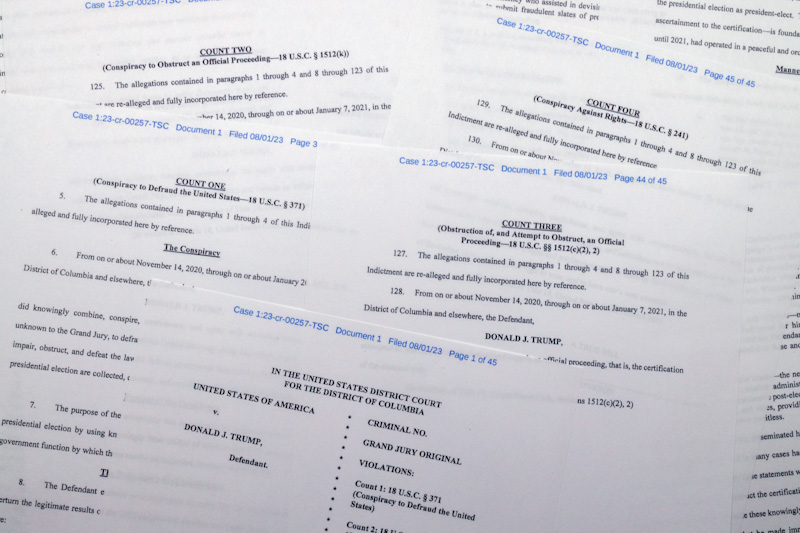Trump’s election-subversion co-conspirators included DOJ official, 4 other lawyers, indictment says

The Aug. 1 indictment against former President Donald Trump alleges that he spread lies that election fraud changed the outcome of the 2020 election and he actually won. Trump knew that his claims were untrue, the indictment says. Photo by Jon Elswick/The Associated Press.
A former U.S. Department of Justice official and four other lawyers were co-conspirators in former President Donald Trump’s effort to subvert 2020 election results and hold on to power, according to the federal indictment unsealed Tuesday.
The Aug. 1 indictment does not name the DOJ official, four other lawyers and political consultant said to be co-conspirators, but details suggest that they include Trump lawyer Rudy Giuliani and then-Chapman University law professor John Eastman, report the New York Times, the Washington Post and Reuters.
The indictment alleges that Trump spread lies that election fraud changed the outcome of the 2020 election and he actually won. Trump knew that his claims were untrue, the indictment says, but he repeated them “to make his knowingly false claims appear legitimate, create an intense national atmosphere of mistrust and anger, and erode public faith in the administration of the election.”
Trump had a First Amendment right to make his false claims and to challenge election results through legitimate means, such as recounts and lawsuits. But Trump also pursued unlawful means to subvert the results, the indictment says.
The New York Times posted an annotated version of the four-count indictment. It alleges that Trump:
- Conspired to defraud the United States by using false election-fraud claims to obstruct the counting and certification of election results.
- Conspired to obstruct an official proceeding—the certification of the electoral vote.
- Obstructed and attempted to obstruct an official proceedings—the certification of the vote.
- Engaged in a civil rights conspiracy by seeking to interfere with the right to have one’s vote counted.
The Washington Post, the New York Times and Reuters said these are the possible attorney co-conspirators:
- The indictment says Co-Conspirator 1 is a lawyer who was “willing to spread knowingly false claims and pursue strategies that [Trump’s] 2020 reelection campaign attorneys would not.” The attorney may be Giuliani, who oversaw Trump’s election-fraud challenges. A spokesperson for Giuliani told the Washington Post that the indictment criminalizes the act of “daring to ask questions about the 2020 election results.” The spokesperson said every fact possessed by Giuliani “establishes the good-faith basis President Donald Trump had for the actions he took” during the period covered by the indictment. A lawyer for Giuliani told the New York Times that the indictment amounted to election interference and “eviscerates the First Amendment.”
- The indictment says Co-Conspirator 2 is a lawyer who “devised and attempted to implement a strategy to leverage the vice president’s ceremonial role overseeing the certification proceeding to obstruct the certification of the presidential election.” The attorney may be Eastman. Eastman’s lawyer said in a statement to the Washington Post and Reuters the indictment “relies on a misleading presentation of the record to contrive criminal charges against presidential candidate Trump and to cast ominous aspersions on his close advisers.” Eastman won’t engage in plea bargaining if invited to do so, the lawyer said.
- The indictment says Co-Conspirator 3 is a lawyer who made unfounded claims of election fraud that Trump privately acknowledged as sounding “crazy.” The attorney may be Sidney Powell, who claimed that voting machines had been hacked and urged Trump to seize voting machines. Powell has said in depositions she thinks that her fraud claims will be proven true. Her lawyer declined to comment to the Washington Post.
- The indictment says Co-Conspirator 4 is a DOJ official who “attempted to use the Justice Department to open sham election crime investigations and influence state legislatures with knowingly false claims of election fraud.” The attorney may be Jeffrey Clark, whom Trump had considered naming acting U.S. attorney general. He did not respond to the Washington Post’s request for comment.
- The indictment says Co-Conspirator 5 is a lawyer “who assisted in devising and attempting to implement a plan to submit fraudulent slates of presidential electors to obstruct the certification proceeding.” According to the Washington Post, the attorney may be appellate attorney Kenneth Chesebro, who suggested that fake pro-Trump electors be recognized by Congress on Jan. 6, 2021. Chesebro did not respond to the Washington Post’s request for comment.
The New York Times, however, said the description of Co-Conspirator 5 “could fit a handful of lawyers.”
The possible sixth co-conspirator was unknown to the New York Times, the Washington Post and Reuters.
None of the alleged co-conspirators were charged.



